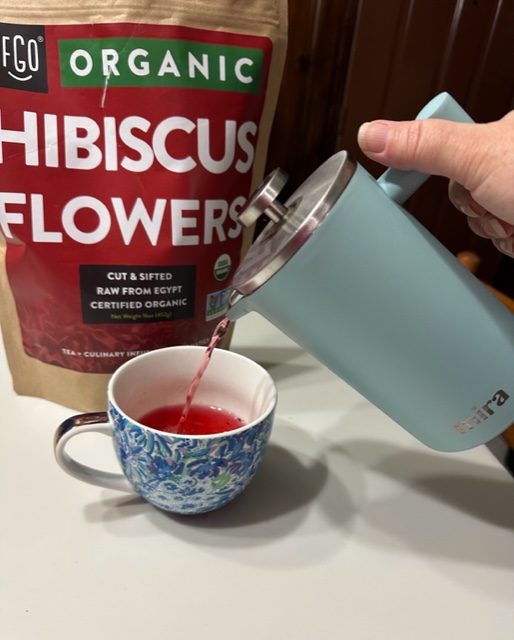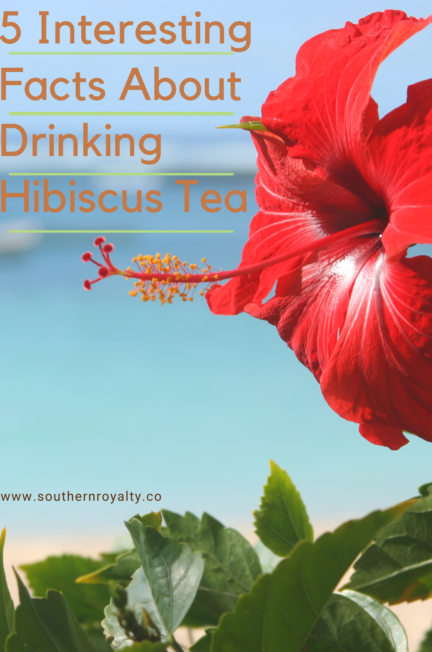👑What is hibiscus tea? Hibiscus tea is an herbal tea made from the calices of a hibiscus flower. The tea has a tart taste but there are healthy benefits of drinking the tea. Used worldwide, there are many uses for the hibiscus plant and here are 5 of most interesting benefits when made into an herbal tea.
This post contains informational and/or affiliate links. At no additional charge to you, Southern Royalty may receive a commission from the pictures and/or links that you click on. Thank you for supporting Southern Royalty.
Disclaimer: This is not medical advice and is for informational purposes only. Always consult a physician for all medical advice and concerns. It is not recommended for women who are pregnant or drinking along with certain prescription medicines. If you are uncertain if you are able to drink hibiscus tea, consult a physician prior to trying it.

Reduce blood pressure & cholesterol.
Research shows that hibiscus can lower blood pressure and cholesterol which also has the potential to reduce cardiovascular disease. People who already have low blood pressure should consult a physician prior to drinking as hibiscus tea will reduce blood pressure even further.
Help with weight loss.
The compounds found in hibiscus tea can help with the “reduction in body weight, inhibition of lipid accumulation and suppression of adipogenesis” (Ojulari et al., 2019) In other words, it reduces the production of fat cells.
Fight certain oral bacteria.
There was a study done to compare 6 different mouthwashes to the hibiscus extract. The hibiscus extract “showed antibacterial activity against all oral pathogenic bacteria” (Baena-Santillán et al., 2021) and had a higher effect than the mouthwashes used in the study.
Fight against certain types of cancers.
In a study done in 2016, the results showed that hibiscus “impaired cell growth, exerted a reversible cytostatic effect, and reduced cell motility and invasiveness.” (Malacrida et al., 2016) Check out this study to see how it can be used to prevent and treat cancer.
Boost the immune system.
Hibiscuses have nutrients that include calcium, iron and vitamin C. Vitamin C is an antioxidant which helps boost the immune system. So, drink hibiscus tea to get some vitamin C.
Just like everything else, too much of good thing can actually be harmful. The recommendation is to only drink 1-3 cups a day so always do your research. Just one teaspoon can have a strong flavor so to reduce the tart taste, try adding lemon, cinnamon, honey or more water. Currently I drink one cup a day in the evenings while I am finishing up for the day. It’s a welcomed treat to end the day with.
Hibiscus flowers can also be used in potpourri, jams and skin & hair products. For other interesting health benefits click here. Like, share and leave a comment below and get on the email list before you go. Remember to do what makes you happy, love the life you’re living and always treat yourself like royalty! 👑
References:
Baena-Santillán, E., Piloni-Martini, J., Santos-López, E. M., Gómez-Aldapa, C. A., Rangel-Vargas, E., & Castro-Rosas, J. (2021). Comparison of the Antimicrobial Activity of Hibiscus sabdariffa Calyx Extracts, Six Commercial Types of Mouthwashes, and Chlorhexidine on Oral Pathogenic Bacteria, and the Effect of Hibiscus sabdariffa Extracts and Chlorhexidine on Permeability of the Bacterial Membrane. Journal of Medicinal Food, 24(1), 67–76. https://doi.org/10.1089/jmf.2019.0273
Malacrida, A., Maggioni, D., Cassetti, A., Nicolini, G., Cavaletti, G., & Miloso, M. (2016). Antitumoral Effect of Hibiscus sabdariffa on Human Squamous Cell Carcinoma and Multiple Myeloma Cells. Nutrition and Cancer, 68(7), 1161-1170. https://doi.org/10.1080/01635581.2016.1208830
Ojulari, O. V., Lee, S., & Nam, J. (2019). Beneficial Effects of Natural Bioactive Compounds from Hibiscus sabdariffa L. on Obesity. Molecules, 24(1), 210. https://doi.org/10.3390/molecules24010210

